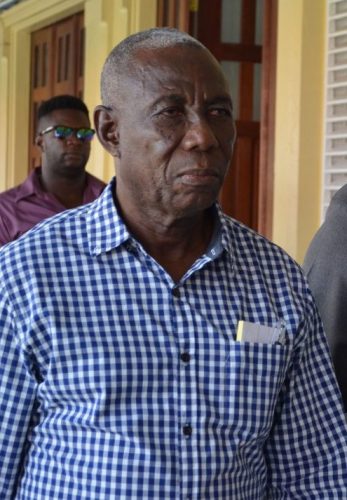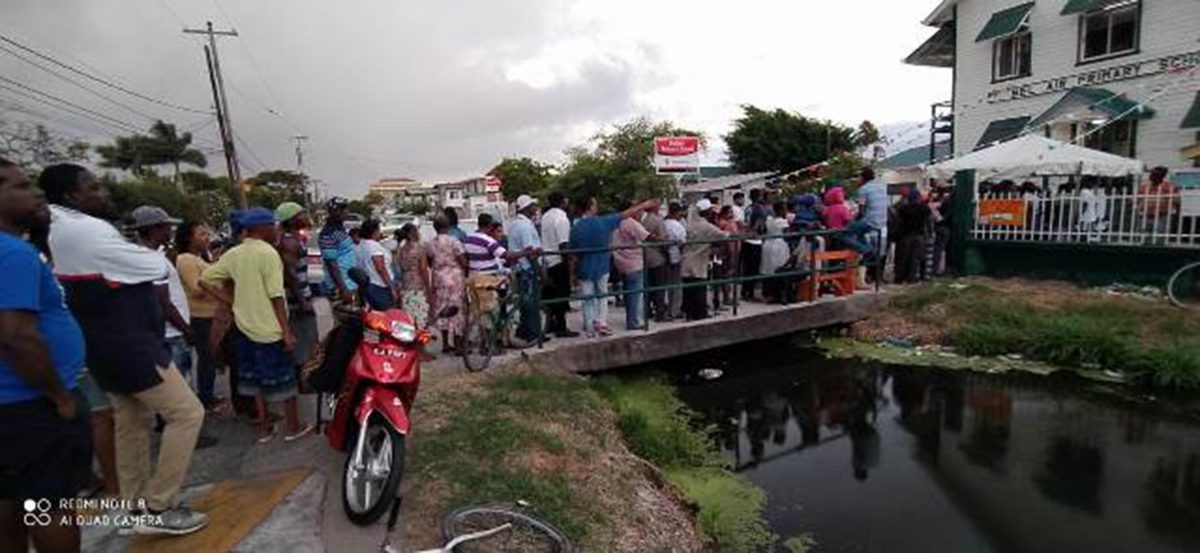More than a year and a half removed from attempts to rig the general and regional elections, government has released proposed amendments setting out processes to be followed for the declaration of results along with penalties ranging from millions in fines to life imprisonment for violations.
The Ministry of Governance and Parliamentary Affairs released draft amendments to the Representation of the People Act (RoPA) on Friday in keeping with President Irfaan Ali’s directive to publicise the intended amendments by the end of this week in order for planned consultations.
Last week, Ali told a virtual press conference six weeks will be given for the review and comments on the amendments after which it would be laid before the National Assembly.

Guyana’s last general and regional elections process lasted exactly five months between balloting and the declaration of final results owing to a series of events, including moves to declare unverified results, court challenges, a national recount and several other issues. There are currently several former Guyana Elections Commission (GECOM) officials, including Chief Election Officer (CEO) Keith Lowenfield, and political party officials before the courts on election-related charges.
Lowenfield was in-structed by the Commission to prepare and submit his final report a number of times before finally delivering, albeit with his own stated reservations.
The draft amendment to RoPA proposes that once the CEO receives the tabulation forms from each district, then they must immediately post them to the Commission’s website and failure to do so or if incorrect documents are posted would see them being liable to fine of $10 million and life in prison.
“The Chief Election Officer shall, after calculating the total number of valid votes of electors which have been cast for each list of candidates, on the basis of the information contained in the District Tabulation Forms received from the returning officers, including District Tabulation Form from the returning officer of district Region 4, under section 84(11), ascertain the result of the election in accordance with sections 97 and 98,” it proposes.
The document also states that the CEO shall, within 12 hours of the calculation of the results, prepare his report for the commission to declare and publish the results of the election.
It states that “the Chief Election Officer commits an offence if he (a) fails to calculate the total number of votes on the basis of information contained in the District Tabulation Forms, as required by subsection (1); (b) prepares the report, required under subsection (2), with falsified information; or (c) fails to prepare the report required under subsection (2) or fails to prepare the report within the time specified under subsection (2), and is liable on summary conviction to a fine of ten million dollars and to imprisonment for life.”
Close of polls procedure
At the close of polls, the draft proposes, the presiding officer would count all ballots and then prepare the Statement of Poll (SOP) in the presence of everyone who is entitled to be there. The draft amendment proposes the presiding officer give every opportunity to those agents to seek clarification and verify the count. Failure to do so would put the presiding officer at risk of 10 years imprisonment and a hefty $10 million fine.
With issues relating to SOPs arising at the 2020 elections, the amendments propose, as a means of strengthening the existing legislation, that the presiding officer complete the ballot paper account in Form 23, the SOP in Form 23A and the SOP account in Form 23B under the scrutiny of agents. They would have to sign as well to give credence to the numbers presented.
Enough copies should also be prepared for distribution to the returning officer, the supernumerary returning officer, the assistant presiding officer, agents, CEO and the GECOM Chair.
Immediately after the distribution of the copies of the documents, the presiding officer shall, in the presence of accredited persons, post the original SOP outside the polling place. A person who removes a Statement of Poll posted outside the polling place, the draft says, commits an offence and would be liable, on summary conviction, to a fine of $10 million and to imprisonment for ten years.
“A presiding officer who denies a duly appointed candidate, counting agent, polling agent or alternate polling agent his right to ascertain the accuracy of the information recorded on the Forms 23, Form 23A and Form 23B under subsection (9) or fails to comply with subsection (9A) (a) commits an offence and is liable on summary conviction to a fine of five million dollars and to imprisonment for five years,” the document further states.
With the exception of Region Four, the returning officers of the other 9 districts, after receiving the envelopes with polling documents and SOPs, would have forwarded those to the CEO who is now mandated to immediately post an electronic copy of the SOP to GECOM’s website.
If the CEO fails to comply or publishes false SOPs, then he would be liable to a $10 million fine and serve a life sentence in jail, according to the proposal.
Sub-districts
The majority of the issues surrounding last year’s results stemmed from the largest electoral district – Region Four (Demerara-Mahaica) – and the proposed amendments focuses on addressing some of those issues.
At the 2020 elections, District Four returning officer Clairmont Mingo was accused of doing a number of things to prevent scrutiny of the results he was declaring. He was accused of not allowing the verification of the numbers, among other things. Ultimately, he was dragged before the courts on several election-related charges and those cases are currently ongoing.
The document proposes splitting Region Four into four sub-districts – East Bank Demerara, East Coast Demerara, North Georgetown and South Georgetown – effectively adding a new section to Section 6 of ROPA, which deals with polling districts and divisions.
With the creation of new sub-districts, comes the responsibility of managing them and as a result, the intended changes include a “supernumerary returning officer and an election clerk” for each of the new sub-districts as well as the appointment for assistant election agent, alternate polling staff and any other assistant agents that may be necessary to be counterparts of the deputy returning officers. The amendment says the returning officer, after receiving the notice of appointment of an assistant agent, counting agent and polling agent, is now required to give public notice of the name and address of the person no later than five days before election day. The existing law does not stipulate a time for such action.
Subsection 6 of Section 24 of ROPA, which deals with the appointment of assistant agents, counting agents and polling agents, sees the proposed addition of three subsections that address the provision of facilities for assistant agents to execute their duties along with penalties.
“A person who obstructs an assistant agent or an alternate polling agent in the performance of his functions by virtue of subsection (7) or (8) commits an offence and is liable on summary conviction to a fine of ten million dollars and to imprisonment for ten years,” the amendment bill proposes.
Addressing the issue of proxy voting, it is proposed that all applications are to be submitted no later than 21 days before election day as opposed to the current 10 days. Additionally, a new subsection proposes to mandate the returning officer to create a list of the names of electors and their proxies which would have to be published on a building in the district of the applicant, daily on GECOM’s website, a newspaper, on television and other media. It states that the publishing of the list is intended for the public to scrutinize and make objections to the returning officer before approval is given to the proxy.
One of the major allegations made by the A Partnership for National Unity+Alliance For Change (APNU+AFC), during the prolonged declaration process was that a number of dead and migrated persons voted. During the national recount of ballots, it furnished a series of names as “evidence” to substantiate the claims. However, many of the listed persons came forward to prove that they were either in Guyana or still alive during the election period.
Addressing the balloting section of ROPA, the draft proposes to have the names of persons removed/deleted from the official list of electors (OLE) at the polling places in the district where they voted.
The draft bill also proposes a new section to deal with election material and information given to polling agents. It recommends that each polling agent be furnished with an OLE or part of the list that contains the information of persons entitled to vote at the polling station, a copy of the list of proxies, a number of SOPs Forms 23A, and registration records of the electors.
“A presiding officer who fails to comply with any provision of subsection (1) commits an offence and is liable on summary conviction to a fine of five million dollars and to imprisonment for ten years,” the draft bill proposes.
Additionally, if an ordinary ballot, instead of a tendered ballot, is issued to someone whose name has already been marked as voted but did not cast a ballot, then the person issuing the ballot would be criminally liable. A fine of $10 million and 10 years in jail is proposed as the punishment upon summary conviction.
District Four
With the proposed creation of sub-districts in Region Four, draft amendments outline that the returning officer shall:
(i) display, using an electronic mechanism, each Sub-district Tabulation Form for all the persons entitled under section 86(1) to be present as attend, to see clearly the information on the Tabulation Form;
(ii) record on an empty District Tabulation Form displayed for all to see, the total votes recorded in favour of each list of candidates in each sub-district on the Subdistrict Tabulation Form as it is being displayed;
(iii) give opportunity for objections from any duly appointed candidate or counting agent and shall not move on to display another Sub-district Tabulation Form unless all the information required from the Sub-district Tabulation Form being displayed is dealt with to the satisfaction of every person present;
(iv) add together the total votes recorded for each list of candidates in each sub-district on the District Tabulation Form and record each total on the District Tabulation Form; …
It further proposes that immediately after ascertaining the total votes cast in favour of each list of candidates, the Returning Officer of district shall publicly declare the total votes recorded for each list of candidates in district Region 4 on the District Tabulation Form.
Failure to deliver to the returning officer of district Region 4 a true certified copy of the Sub-district tabulation form or delivering the form with falsified information would be an offence for which a person would be liable on summary conviction to a fine of ten million dollars and to imprisonment for life.
Recount
Parties have a specified timeframe in which they can request a recount of the ballots in the electoral districts. During the 2020 elections, a number of recounts were requested. Some were granted and some were not for various reasons, including being served to the wrong personnel.
In the end, there was a national recount supervised by a high-level team from the Caribbean Community (CARICOM).
Moving to prevent a repeat of those situations, the draft amendment proposes that all requests for recount be submitted, in writing by hand, to the returning officer of the district. If the returning officer is unavailable, the deputy returning officer, or in the case of a sub-district, if both the returning officer and the deputy returning officer are unavailable, the supernumerary returning officer of the sub-district shall receive and grant the request.
Additionally, where all the persons required to receive and grant a request for a recount are unavailable, the request may be submitted to the CEO or the Chair of GECOM.






